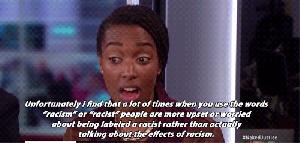
(this video, this tumblr post for gif)
It is not offensive to call someone racist or sexist.
In our culture, the default is racist and sexist. It should not be offensive to be told the truth, that you grew up in a culture that encouraged bigoted thoughts and behavior because those benefit a hurtful system of power. Even though I exert a lot of effort to educate and improve myself, I know I am racist and sexist - I am saying as a mulatto woman. We all internalize negative messages, even about ourselves. The work of unpacking is unending. We can't stop before the work begins because we're offended. We can't stop because it's hard because it's harder to be the recipient of these harm from these systems of power.
People are called racist or sexist based on their behavior. As long as the problematic behavior is pointed out and the reason/basis for the problem is explained, that call out is valid.
For example, a while ago, a friend of mine called me out for the way I was blogging about the Sochi Olympics. I didn't understand why at first. I was defensive; I explained why I thought that what I was doing was right. But also I listened to what she said; I asked how I could respect her and her culture. I didn't leave seeing everything the way she did, but I sympathized with her position - I did my best to relate her experience to my experience to understand where she was coming from, why she was hurt. I asked questions about why what I wrote was a problem. Once I understood, I apologized. I thanked her for trusting me. I changed the way I spoke and wrote about the topic.
Of course, I'm still going to mess up, but I'm trying. I didn't deny that the way I acted was harmful. Instead, I changed my behavior so I wouldn't be harmful in the future. I hope that our friendship grew because of talking about this.
Call outs are not about silencing. Call outs are usually meant to be the start of a conversation. One doesn't passively receive a call out nor does one stop talking because of a call out. As I said, I asked why what I did was wrong or hurtful. The call out was part of a conversation: a conversation I needed to listen to and engage with about the topic. Of course, the person who was offended is not responsible or required to engage with you. If they ask you to google it or refer you to other resources, that's still about talking and listening to those specifically educational sources. We aren't offended by out teacher's saying "You are wrong." We listen to our teachers and correct our error. Nor do we require everyone to be a teacher all of the time.
Mthembu highlighted the need to engage in open dialogue about race, despite the potential discomfort. [...] In order to have these vital conversations, Mthembu explained, “We have to allow for mistakes and forgive each other.” (MIT Black Lives Matter event)
Call outs are helpful, educational, trusting. If I am calling someone out, it is because I think they can change their behavior. Often, I only call out people who I care about, people I trust enough not to be violent or hurtful. I call people out because I think, Surely this person wouldn't want to hurt me, surely they'd care enough to change their behavior. Someone - a friend, colleague, activist - has invested time and effort to bring a matter to your attention, likely a matter that they care about and affects them. A call out is supposed to instigate deep thinking: Why was this wrong? How can I improve?
Of course, most times this is not the response. People become angry or defensive.
[embed]https://www.youtube.com/watch?v=C8xJXKYL8pU[/embed]
They say 'I'm not! I didn't mean it that way! You know I'd never!'
'It's not helpful to call people racist. Surely you've messed up before'
'Why can't you just accept different opinions? Why are you so angry, aggressive, worked up, sensitive?'
A call out is not about any of those things. Some people think that call outs are a call to censorship. But they are not. They are a call to consideration and respect; we have all learned from an early age to express ourselves carefully and with consideration for others. We do not blurt "I want that now! Mine!" We do not throw things to express our anger. We don't cuss at people when we are upset with them. Hopefully. Similarly, we must learn how to empathize and respect people in the way we speak, write, and act.
No comments :
Post a Comment